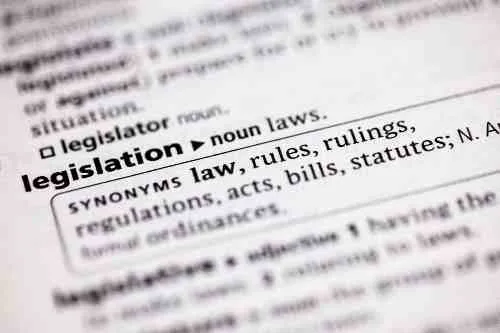Why study this Legal Terminology course?
If you’re passionate about law and justice, our self-paced online Legal Terminology course is designed for you. Whether you want to upskill to advance in your career or get a head start on future tertiary studies, our Legal Terminology course will have a positive effect on your future. You will also be able to apply the knowledge you gain from this course to your everyday life. This course covers content that will help you to understand legal terms that will be used if you are buying or renting property, taking out a loan, writing or interpreting a will, or signing a contract.
What will you learn?
In this online Legal Terminology course, you will learn about the language and terms used in federal, international and historical legal systems. Terms used across all areas of law, as well as the specific areas of criminal law, family law and civil law, are covered in the course. You will also learn about the different functions of state, federal and international courts, and the roles of people who contribute to the success of the legal system, including barristers, solicitors, and paralegals.
Who is this online Legal Terminology course for?
This Legal Terminology course is designed for legal or law enforcement professionals, as well as business owners, activists, and journalists. You will learn legal terms that are relevant across many fields, from law and justice to business, social work, politics, sales, administration, and real estate. Learn more about legal terms that are relevant to your field to become a more skilled professional and advance in your career.
This course is also suitable for anyone who desires to learn more about federal and international legal systems or has a general interest in law. The course will help you become familiar with terms frequently used in legal proceedings, documents, and publications in various fields of law.
What are the benefits of studying online?
This Legal terminology course gives you the flexibility to study whenever, wherever and however you like. You’ll be able to learn at your own pace with the support of your knowledgeable tutor who has real-world experience in their field. No matter how busy you are, our adaptable online learning plan will help you fit study into your schedule.
Legal Terminology Course Aims:
Lesson I. INTRODUCTION TO LEGAL TERMINOLOGY
In this lesson:
- Students will learn how knowledge in legal terminology is both important and useful as an introductory legal course, especially for non-lawyer professionals.
- They will be introduced to the two main legal traditions in the world, namely civil law and common law.
- They will learn how to identify and analyse comparative legal systems, including points of commonalities and differences, such as codification and the importance of judicial precedent.
Lesson II. HISTORY OF COMMON LEGAL TERMS
In this lesson:
- Understand the importance of knowing the root words of various legal terms used around the world, and their underlying concepts.
- Be introduced to Latin and Green words which have been adopted into the global legal dictionary.
Lesson III. THE LEGAL SETTING: THE VARIOUS FIELDS OF LAW
In this lesson:
- Students will be introduced to administrative law, including government structure and the concept of separation of powers.
- Become familiarized with the various fields of law and their respective coverage
Lesson IV. THE LEGAL SETTING: STAGES, PROCESSES AND ACTORS
In this lesson:
- It will focus on the judicial branch of government.
- Students will learn about remedial law, including the various kinds of courts, court processes (including initiation of lawsuits and the concept of appeal), as well as the legal actors (the parties to the lawsuit, paralegals, the different kinds of lawyers per jurisdiction, and the members of the Judiciary).
Lesson IV. INTRODUCTION TO PROPERTY LAW
In this lesson:
- Students will be familiarized with the different kinds of tangible property, as well as key terms in the law on property
- Students will also be introduced to the concept of intellectual property and its various forms and protections, including copyrights, patents and trademarks.
Lesson V. LAWS RELATED TO TRANSFER AND CONVEYANCE OF PROPERTY
In this lesson:
- The different modes of transfer of ownership of property will be discussed.
- In particular, students will learn key terms related to succession and inheritance will be defined, notably those regarding to both probate and intestate court proceedings as well as other modes of conveyance which will be introduced are donations, mortgages and foreclosures, and sales and credit.
Lesson VI. COMMERCIAL LAW: CONTRACTS AND INSURANCE
In this lesson:
- Students will be introduced to the essential elements of a contract, as well as various modes of fulfilling or negating contracts such as common life insurance policy as a form of contract, and in the process also define key terms covered under insurance law.
Lesson VIII. COMMERCIAL LAW: CORPORATIONS AND BANKS
In this lesson:
- Students will be familiarized with the different kinds of corporations from around the world, as well as concepts related to inter-corporate and intra-corporate affairs, such as arbitration.
- Students are also introduced to concepts related to banking and bankruptcy, including financial and economic terms commonly used in the field of law.
Lesson IX. LAWS COVERING NON-CONTRACTUAL OBLIGATIONS
In this lesson:
- Family law will be discussed, including key terms like adoption, support and other domestic issues.
- Students will learn about the criminal justice system, and will be introduced to the varying means of classifying the same criminal act in different jurisdictions as well as gaining familiarity to terms relating to the law on torts, as well as concepts related to it, including standard of care and damages
Lesson X. INTERNATIONAL LAW
In this lesson:
- Students will be introduced to two main categories covered by international law, namely public international law and private international law with an emphasis on how international law is important even in the daily life of an average citizen.

